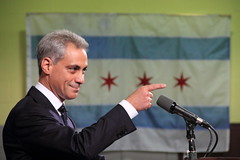 The mayor of Chicago, Rahm Emanuel, has just announced details about his new “wellness plan”. City employees who choose not to participate in it will be charged $50.00 more on their health insurance. This could be called an insurance “disincentive”.
The mayor of Chicago, Rahm Emanuel, has just announced details about his new “wellness plan”. City employees who choose not to participate in it will be charged $50.00 more on their health insurance. This could be called an insurance “disincentive”.
Some employers are able to offer employer sponsored health insurance to their employees. It has become a fairly common practice to offer the employees certain types of incentives that are designed to reduce the cost the business pays for health insurance, overall. Usually, it works by rewarding employees who lose weight, stop smoking, or who start working out, with a variety of “prizes”.
The employees start a program that helps them to quit smoking, or to lose weight. The employer might start keeping track of how often an employee who is doing the incentive program goes to a gym. The goal could be for individual employees, or it could be a group effort from several employees.
Those that get healthier receive prizes that could be anything from cash, gift cards, concert tickets, or a lower premium on their health insurance. Employees who don’t participate in the incentive program continue to pay their usual insurance premium.
Obviously, the employers who have really healthy employees are going to end up paying less on the health insurance that they offer to their workers. This is because healthy workers don’t tend to need lots of expensive prescription drugs, frequent hospital visits, or certain types of medical equipment. The workers who get healthier feel better, don’t end up needing to take as many sick days, and are more productive.
The mayor of Chicago, Rahm Emanuel, has announced a new “wellness plan” that is designed to encourage city workers to become healthier. A closer look at this plan reveals it actually offers a negative consequence for workers who choose not to participate in the plan. Those who do participate don’t get a reward, either.
City workers, and their spouses, can participate in the new wellness plan for free. They have to get annual health screenings. They have to be willing to receive follow up phone calls from doctors and other medical providers, so the doctors can point out to the workers “areas of concern”. The idea is that the workers should take the advice of the doctors, and work towards improving their health.
If a city worker decides not to participate in the wellness plan, (or if the person’s spouse doesn’t choose to do it), then they will be expected to start paying an increase of $50.00 on their health insurance premiums. The workers (and spouses of workers) who participate in the plan don’t get a reward of any kind, but they don’t get dinged with the $50.00 increase on their premiums. This is the opposite of a health insurance incentive program.
Image by Daniel X. O’Neil on Flickr

